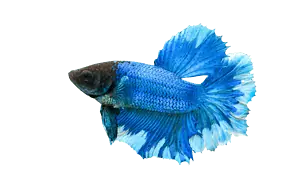Guppies and bettas are two of the most colorful fish found in home aquariums.
But, the bright colors and extravagant tails only apply to the males of both species.
Female guppies and bettas have duller colors with shorter fins and tails.
Guppies and betta fish have similar needs when it comes to water parameters.
So, can guppies live with bettas in the same tank?
Yes, guppies and bettas can live together in the same tank. But you must take several precautions when housing guppies with betta fish. Never place male guppies with a male betta. The only possible combination for this type of community tank is female guppies with a female betta.
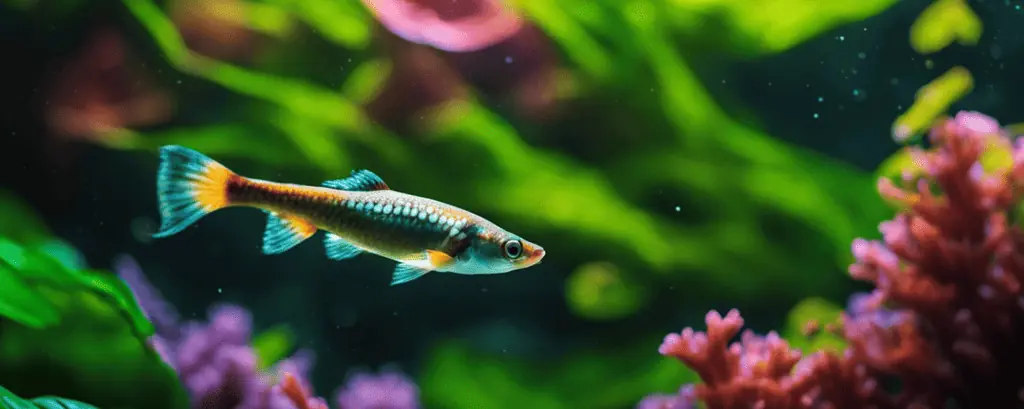
Table of Contents
Can Betta Fish and Guppies Coexist Peacefully?
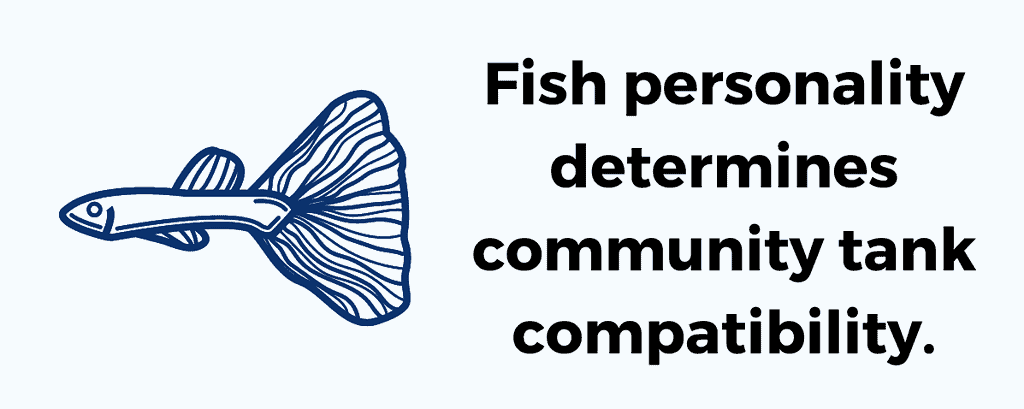
The biggest factor in determining compatibility in a community tank is your fish’s personality.
Setting up a community tank with aggressive betta fish is difficult.
You must follow certain rules when placing guppies in the same tank as a single betta.
Putting the wrong type of betta with the wrong type of guppy does not bode well for either fish.
Keep a separate tank handy in case your fish do not get along.
Male Guppies and a Male Betta – Absolutely Not
Guppies are usually peaceful fish, but males become aggressive when they compete for females.
Displays of aggression are not unusual for a male betta.
Placing male guppies with a male betta is a recipe for disaster.
Male guppies have flashy colors and flowing fins like male bettas.
The betta may confuse the guppy for another betta and attack.
This is the worst combination of guppies and betta fish.
Female Guppies and a Male Betta – Not Good for the Betta

Female guppies do not have colorful tails or bodies. This makes them less of a target for aggression from a male betta.
But, in this combination, the male betta is the one in danger.
Guppies are fin nippers, and the male betta’s long fins are a prime target for attack.
Fin nipping puts your male betta at high risk for developing fin rot. Fin rot is a severe disease and may cause death if it spreads to the body.
We strongly advise against this combination of guppies and bettas.
Male Guppies and a Female Betta – Not Good for Either Fish
The likelihood of aggression from a female betta is much lower than from a male.
But, male guppies may mistake the female betta for a female guppy and attempt breeding with her.
Your female betta will likely attack the male guppies when this happens.
The long fins of male guppies also place them at a higher risk of fin nipping from the female betta.
This combination is dangerous for the guppies and betta.
Female Guppies and a Female Betta – Yes, But With Caution
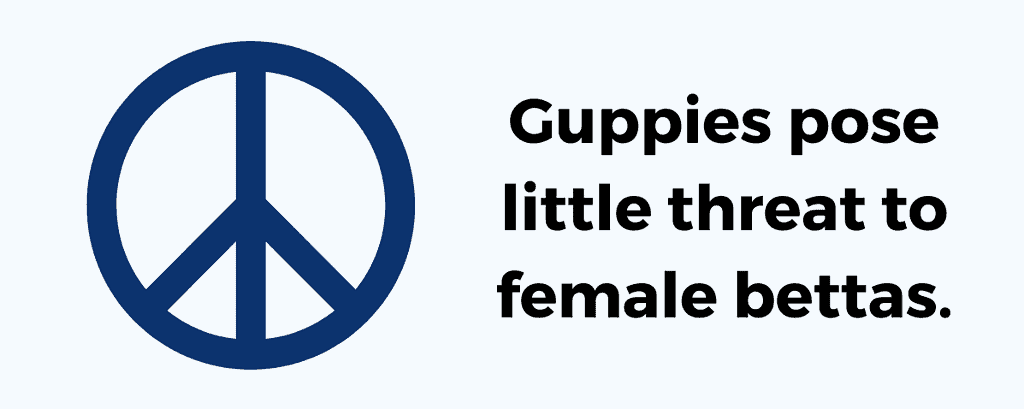
The levels of aggression displayed by female bettas are much lower than male bettas.
Female guppies are less of a threat to a female betta.
There is only one issue with this combination of guppies and betta fish.
Female betta sororities establish a pecking order. This may cause bullying from one female betta to another.
Your female betta may confuse the female guppies for a sorority sister and attack.
The female fish from both of these species also lack the attractive colors of the males.
While they do not add much color to your aquarium, this is the only possible combination of guppies and betta fish.
Do Bettas and Guppies Have Similar Care and Tank Conditions?

We have guided you through the complicated relationships between guppies and bettas.
Now, you must consider the best setup for this community tank environment.
Fortunately, setting up the tank for these two types of fish is a much simpler task.
Tank Size Recommendations
Keeping a betta with guppies requires plenty of space in the aquarium.
A 10-gallon tank works well for a single betta but is not adequate for a healthy community tank.
The smallest tank size we recommend for a betta with guppies is 20 gallons.
If you have ample space in your home, a 30-gallon tank is even better.
Guppies are schooling fish and feel safest in groups of six or more of their kind.
The last thing you want is your fish fighting for space.
Overcrowding causes immense stress in fish. It not only lowers their immune system but increases aggressive behavior.
Larger fish tanks support more stable water parameters and reduce the risk of territorial behavior.
Water Temperature and pH Level Requirements
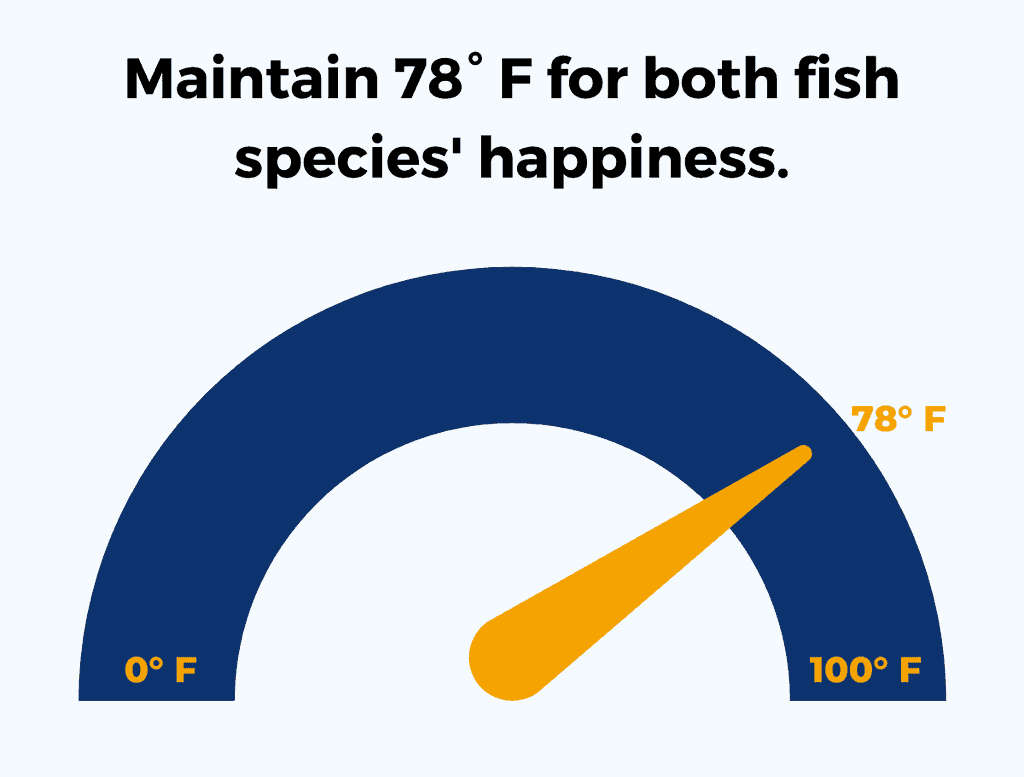
Guppies and bettas are both tropical freshwater fish.
Wild guppies live in lakes and rivers throughout South America. A betta’s natural habitat is rice paddies and streams in Southeast Asia.
Ideal temperatures for guppies are between 74-82° degrees Fahrenheit (28° C). Bettas have a smaller temperature range of 78-80° degrees Fahrenheit (27° C).
Maintaining a warm water temperature of 78° degrees Fahrenheit (26° C) is best for both fish species.
Invest in a quality aquarium heater and a separate thermometer.
The thermostats on tank heaters sometimes fail. A separate thermometer ensures the water is at a consistent temperature.
The pH levels for guppies may range from 6.8-7.8. Bettas prefer a more neutral pH of 7.0.
A neutral pH of 7.0 keeps both fish species happy.
Use an aquarium testing kit to check pH, ammonia, and nitrite levels in your tank. Ammonia and nitrite are very toxic to fish.
Perform partial water changes of 20-25% every week. This helps remove toxins and maintains comfortable water parameters.
You must also include an aquarium filter with a low flow. Guppies and bettas have difficulty swimming against strong currents.
Feeding Considerations
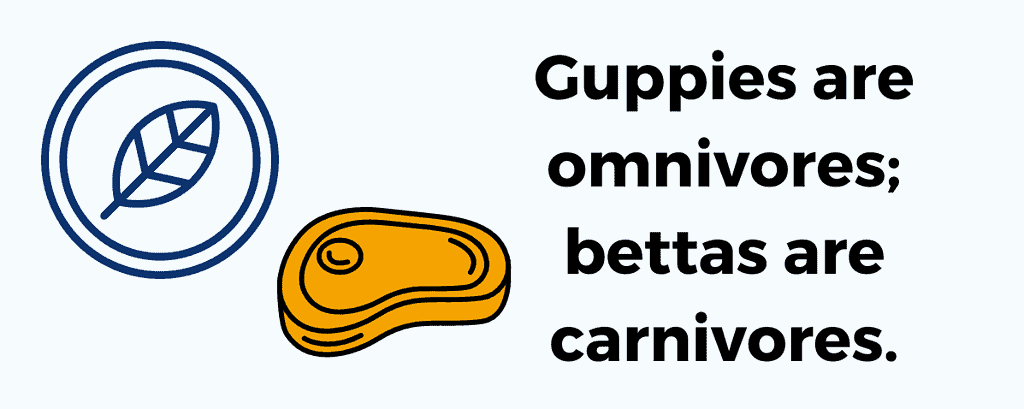
Guppies are omnivores and bettas are carnivores.
A guppy can eat betta food but needs plant matter in its diet for complete nutrition.
High-quality pellets like these make the perfect staple diet for guppies. They contain all of the essential nutrients your guppies need, plus probiotics for healthy digestion.
Betta fish need a staple diet rich in meat-based proteins. This betta pellet food is nutrient-dense, with 37% protein and garlic for immune system health.
We always recommend pellet foods over fish flakes. Fish flakes usually contain more fillers than pellets, creating a mess in the tank.
You may feed your guppies and betta treats 2-3 times per week instead of their usual staple foods.
Treats add variety to your fish’s diet and prevent boredom at feeding time.
Some treats your guppies and betta can both enjoy include:
- Baby brine shrimp
- Mosquito larvae
- Blood worms
- Black worms
- Daphnia
These treats come in live, frozen, and freeze-dried varieties.
Always source these types of foods from reputable sources. This lowers the risk of parasites or other contaminants in the food.
Other Tank Setup Requirements
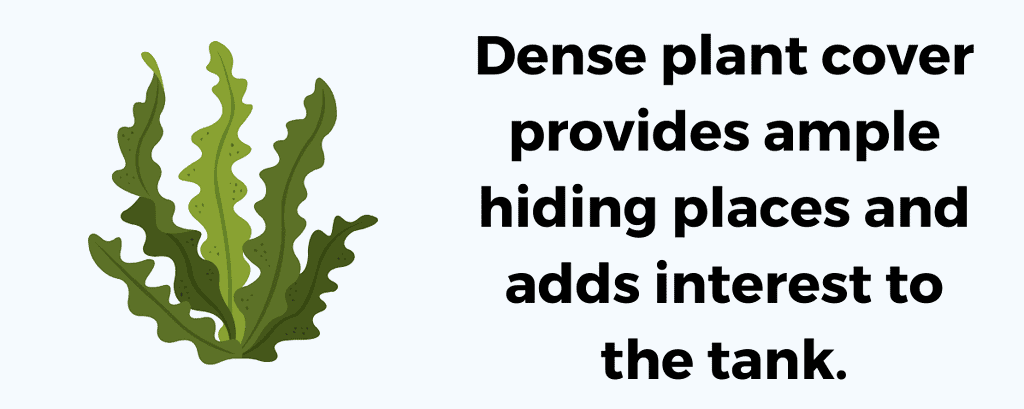
Besides adequate space and healthy water parameters, you must also provide some tank decorations.
Tank decorations help create a more natural environment for the comfort of your fish.
Substrate
A smooth gravel substrate works well for a guppy-betta tank.
Cleaning this type of substrate is easy and comes in various colors.
Place at least 2-3″ inches of substrate in the bottom of the tank.
Gravel substrate catches fish waste and leftover food. Use a gravel vacuum for cleaning the substrate during weekly water changes.
Lighting
Lighting encourages plant growth and helps your guppies and betta regulate their eating and sleeping habits.
Adjustable LED lighting is the best choice. LED lighting does not produce excess heat.
And you have to power to adjust it so it is not too harsh for your fish.
Plant Life
Filling the tank with lots of aquatic plants creates a more natural environment.
Dense plant cover provides ample hiding places and adds interest to the tank.
You may choose from a wide variety of aquarium plant species, such as:
- Anubias
- Java fern
- Java moss
- Anachris
- Amazonian frogbit
- Water sprite
- Guppy grass
These plant types are suitable for both guppies and bettas.
Remove dead plants as soon as you find them. Dead plants produce ammonia as they rot, creating hazardous water conditions for your fish.
Hiding Places
Ample hiding spaces are crucial when you have bettas in community tanks.
These hiding spots offer places of escape and rest.
Driftwood, small caves, and smooth rocks make excellent hiding places for guppies and bettas.
Make sure the hiding places do not have coarse textures or sharp edges. Sharp points may injure your fish or tear their fins.
How To Feed Guppies and Bettas in the Same Tank
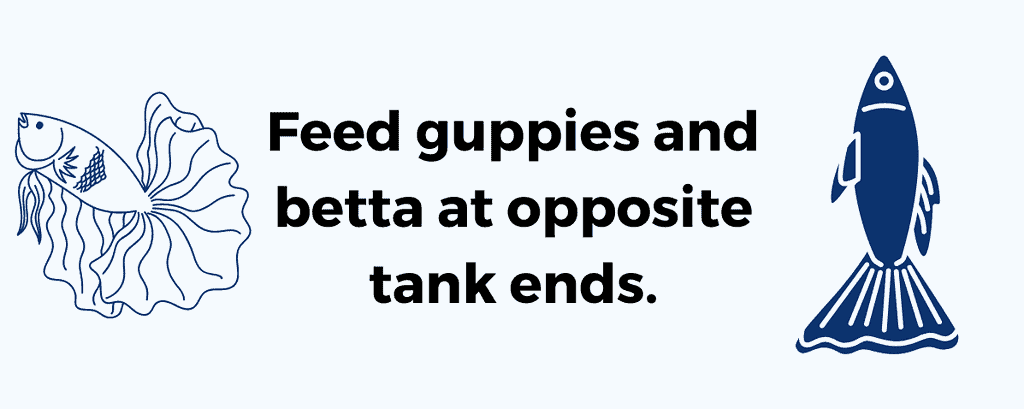
Guppies are fast swimmers and may steal a betta’s food if you do not watch them closely.
Feeding the guppies first keeps them distracted while the betta eats.
We recommend feeding your guppies and betta at opposite ends of the tank.
Drop the guppy pellets in first, and then the betta pellets.
Feed your fish two small meals at least 6-8 hours apart daily. This allows for proper digestion in between meals.
Choose the same day every week for fasting your fish.
Fasting lets your fish digest any food left in their stomachs. This prevents issues like bloating, constipation, and swim bladder disease.
Avoid overfeeding your fish at every meal.
Overfeeding causes severe health issues in fish. It also makes maintaining clean water challenging because there is more fish waste.
Remove uneaten food when feeding time is over. Rotting food releases ammonia and bacteria into the water.
How Many Guppies May Be Safely Kept With a Betta Fish?
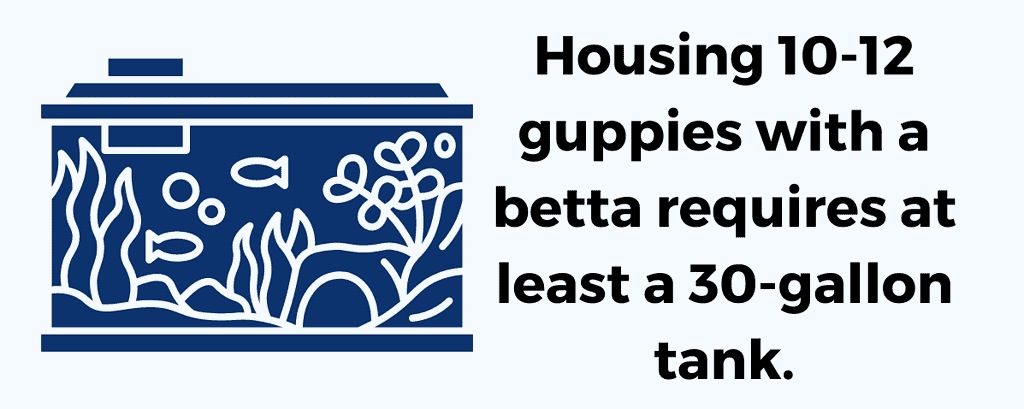
The number of guppies you may have with a betta depends on the size of your tank.
Guppies are active swimmers and must have at least six fish in their group. Their lively behavior may annoy a betta if there is not adequate space.
The rule of thumb is usually one gallon of water per inch of fish with guppies.
We recommend increasing this to two gallons of water per fish when keeping bettas with guppies.
You may keep 6-8 guppies with a betta in a 20-gallon tank without overcrowding.
Housing 10-12 guppies with a betta requires at least a 30-gallon tank.
Female guppies are a bit larger than male guppies.
You must also account for the space taken up by plants and hiding spots.
If you notice signs of aggression, address the issue right away.
Consider adding a tank divider until levels of aggression decrease.
Continued displays of aggression may require a separation.
Moving the aggressive fish to a separate tank is the only solution in severe cases.
This avoids undue stress and keeps your fish happier.
Can You Keep Bettas and Guppies With Other Fish Species?
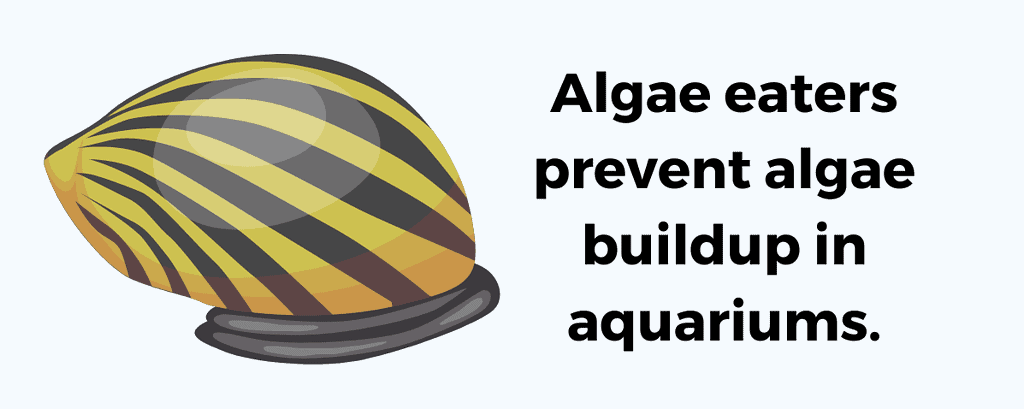
Never add more fish than your tank size can handle.
Quarantine new fish for 4-6 weeks before adding them to the community tank. This ensures they do not carry contagious diseases or parasites.
Choose healthy fish with friendly temperaments and similar care requirements.
Some common fish species compatible with guppies and bettas are:
- Corydoras catfish
- Endlers
- Harlequin rasbora
- Kuhli loach
- Otocinclus catfish
- Nerite snails
- Amano shrimp
As a bonus, some of these species are algae eaters.
Algae eaters are an excellent addition to any aquarium. They help prevent algae buildup on the substrate and sides of your tank.
Any time you add new fish to a community tank, you must watch them closely.
If you see signs of continued aggression, remove the new fish immediately for their safety.
For a comprehensive list of other companions for your betta, check out our article on the best betta tank mates.
Guppies and Bettas: No Boys Allowed
Keeping female guppies with a female betta is the only successful combination of these two fish species.
Provide a large tank with clean water and plenty of hiding spots for a better chance of a successful community tank.
Pay attention to the behavior of your fish for any signs of aggression. Have a separate tank ready in case your fish start fighting.
Even in ideal conditions, keeping fish happy is a challenge.

